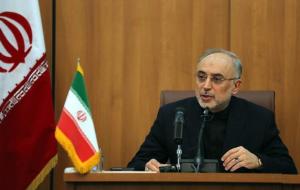JohnButts@JBMedia - Reports:
Iran and the United States said Sunday that a landmark deal Tehran struck with world powers on its disputed nuclear programme will take effect from a January 20 target date.
Under the deal reached in November, Tehran agreed to curb parts of its nuclear drive for six months in exchange for receiving modest relief from international sanctions and a promise by the so-called P5+1 powers not to impose new measures against its hard-hit economy.
"Both sides reached the same interpretation on how to implement the agreement and the first step will be executed from January 20," Iran's chief nuclear negotiator Abbas Araqchi said, quoted by IRNA news agency.
The White House was quick to confirm the news but President Barack Obama warned there was still a rough road ahead before a comprehensive solution can be nailed.
"Beginning January 20th, Iran will for the first time start eliminating its stockpile of higher levels of enriched uranium and dismantling some of the infrastructure that makes such enrichment possible," it said.
Obama said in the same statement: "With today's agreement, we have made concrete progress. I welcome this important step forward, and we will now focus on the critical work of pursuing a comprehensive resolution that addresses our concerns over Iran's nuclear programme.
"I have no illusions about how hard it will be to achieve this objective, but for the sake of our national security and the peace and security of the world, now is the time to give diplomacy a chance to succeed."After two days of exhaustive talks, Iran and the European Union agreed Friday on how to implement the deal on containing Tehran's nuclear programme.
The EU represents the P5+1 -- Britain, China, France, Germany, Russia and the United States -- in the decade-long nuclear negotiations.
New generation nuclear centrifuges
On Friday Araqchi had said solutions were found for unspecified points of disagreement but that each country must approve the deal for it to take effect.
On Sunday IRNA quoted him as saying: "Finally today we reached an agreement with P5+1 on how to implement the first phase of the agreement."
"The agreement and solutions we found in Geneva were accepted by six countries and on this side, the relevant bodies made the necessary evaluation and also gave them their approval," the website of state television quoted him as saying.Iran and world powers have held several sessions of talks in Vienna and Geneva to fine-tune the deal in the past weeks and the target date of January 20 was reached at the last round in Geneva.
Diplomats said there were three main hurdles at the last session of negotiations, namely over a new generation of Iranian nuclear centrifuges which could potentially enable Tehran to purify uranium to a weapons-grade level.
Western nations and Israel have long suspected Iran of pursuing a nuclear weapons capability alongside its civilian programme, charges Tehran strenuously denies.Iran's nuclear chief Ali Akbar Salehi defended Tehran's "right" to carry out reasearch on advanced centrifuges.
"Advanced centrifuges, which are Iran's right (to use), were one of the points of disagreement raised by the other party," Salehi was quoted as saying by Fars news agency.
In August, Iran said it has about 19,000 centrifuges, including 1,000 of new P-2 generation, confirming figures from the UN watchdog overseeing its nuclear drive.
Among the main points of the November deal, Iran agreed it will not enrich uranium over five percent for the duration of the six months and committed to neutralise its entire stockpile of uranium enriched to 20 percent.
It also agreed to allow daily site inspections of its Fordo and Natanz enrichment facilities by experts from the UN nuclear watchdog IAEA as well as hand over information about the design of the Arak reactor.
In return, the P5+1 said it will ease sanctions in what the White House has described as a "limited, temporary, targeted, and reversible" manner to the tune of about $7 billion.
Meanwhile an agreed amount of revenue from sanctioned Iranian oil sales abroad would be repatriated.
The latest round of talks in Geneva came as Iranian President Hassan Rouhani voiced concern at the slow pace of implementation and called on the countries to respect their commitments.
